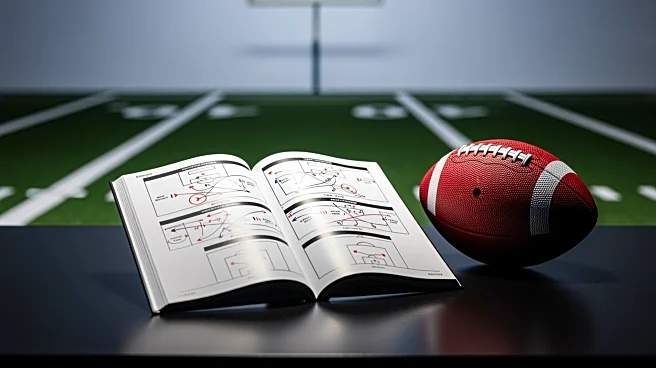What's Happening?
Miami Dolphins head coach Mike McDaniel is evaluating his options for the backup quarterback position ahead of the team's matchup with the Atlanta Falcons. The competition is between veteran Zach Wilson,
who was signed in the offseason to a guaranteed one-year, $6 million deal, and rookie Quinn Ewers. Wilson began the season as the backup to Tua Tagovailoa but was replaced before the game against the Cleveland Browns. McDaniel has noted that both quarterbacks have elevated their level of play during practice this week, delaying a final decision. The coach emphasized the importance of competitive drills to further assess the players' capabilities and determine who will hold the backup position for the foreseeable future.
Why It's Important?
The decision on the backup quarterback is significant for the Dolphins as it reflects the team's confidence in their offseason acquisition of Zach Wilson. Wilson's performance has been under scrutiny, especially after losing his backup spot without public explanation. This situation raises questions about the Dolphins' strategy and their investment in Wilson, who has struggled to adapt to McDaniel's offensive system. On the other hand, Quinn Ewers' emergence as a potential backup offers the team a developmental option for the future. The choice between Wilson and Ewers could indicate a shift in the Dolphins' focus from immediate wins to long-term evaluation, impacting the team's depth and decision-making processes.
What's Next?
Coach McDaniel is expected to make a decision following further competitive drills and evaluations during practice. The outcome will determine whether the Dolphins continue to invest in Wilson or pivot towards developing Ewers as a future asset. This decision could influence the team's strategy and roster management moving forward, especially if Ewers proves to be a better fit for McDaniel's system. The choice will also affect the team's confidence in their offseason decisions and could lead to adjustments in their approach to player development and acquisition.
Beyond the Headlines
The situation highlights the challenges teams face in balancing financial investments with player performance and development. The Dolphins' decision could have broader implications for how NFL teams approach contracts and player evaluations, particularly when high-priced acquisitions do not meet expectations. It also underscores the importance of adaptability and fit within a team's system, which can be crucial for a player's success and the team's overall performance.








